THE STORY OF THE REAL FOUNDER OF ROCK 'N' ROLL
THANK YOU BILL HALEY
For most people, Haley’s career started with the recording of „Rock Around The Clock“ and its unprecedented worldwide success. But they do not realize that the success of this hit (with a big portion of good luck) was mainly the result of a long period of hard work and a just reward for a man who recognized the potential of this musical style and marked it with his name as none other.
William John Clifton Haley jr. was born on 06 July, 1925 in Highland Park, Michigan, and grew up in Booth-Win, Pennsylvania. The Kentucky-born father inspired his son from a very early age to the numerous facets of Country & Western music: hillbilly, yodeling, the singing cowboys, as well as the western swing
THE EARLY YEARS
Bill first started singing and playing in local villages either as solo performer or together with Cousin Lee’s Band, before he went on the road, fired by his enthusiasm to develop his musical career.
The next group Haley joined in 1945 was the “Down Homers” out of Harford, Connecticut. The group was comprised of Everett “Shorty Cook” Hinderer. Haley likely played on Down Homers’ sessions but may not have been involved on their records. He is definitely pictured with the group in this photo.
Haley joined to replace the band’s yodeler who went into the Navy (yes Haley started off as a supreme yodeler). Kenny Roberts was the group’s bass fiddler and he worked very closely with Haley to develop his state presence. They performed out of Fort Wayne, Indiana on radio station WOWO.
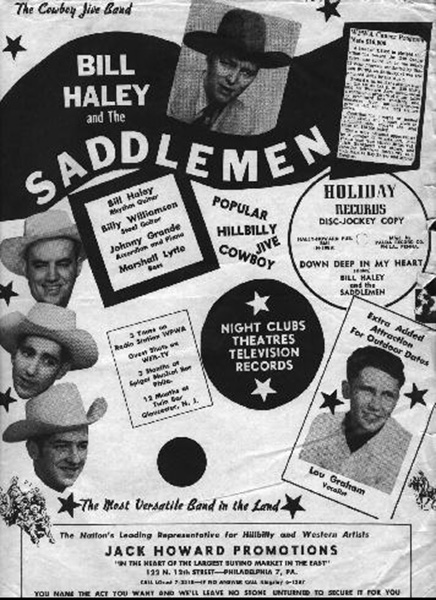 Bill Haley and The Saddlemen promotional poster from 1951
Bill Haley and The Saddlemen promotional poster from 1951
THE FIRST OWN BANDS
Bill returned to Pennsylvania to start working as a disc jockey at the WPWA radio station where he founded his first band, The Four Aces of Western Swing, followed by The Saddlemen. During this period, he recorded his songs at different regional record labels – Cowboy, Center, Arcade, Keystone and Atlantic. His experiences at the radio station and his numerous public performances soon gave Haley a good ear for commercial music and the ability to recognize the demands of his audience.
Saddlemen recording highlights included romantic ballads such as „Rose of My Heart“ and western swing tunes such as „Yodel Your Blues Away.“ The original members of this group were Haley, pianist and accordion player Johnny Grande and steel guitarist Billy Williamson. Al Thompson was the group’s first bass player, followed by Al Rex and Marshall Lytle. During the group’s early years, it recorded under several other names, including Johnny Clifton and His String Band and Reno Browne and Her Buckaroos (although Browne, a female matinee idol of the time, did not actually appear on the record).
In the early fifties, Haley and his Saddlemen signed their contract at Dave Miller’s Essex Label. Haley continued to fuse his Western Swing together with the black Rhythm & Blues – a mixture that added great amount of success to his performances, and the first commercial hit record, a new version of Jackie Brenston’s Rocket 88.
THE RISE OF THE COMETS
In 1952, The Saddlemen exchanged their cowboy hats for the legendary red plaid jackets, thus creating their new style – The Comets were born. During the following year, Haley raised his popularity among a fast-growing audience of young people with his composition of Crazy Man Crazy – a song which used the slogans of these teenagers and subsequently became his first nation-wide hit. The biggest American record companies were now interested in signing contracts with Haley, and after checking the offers of Mitch Miller (Columbia) and Steve Sholes (RCA Victor), he struck the deal with DECCA Records.
„Rock Around The Clock“ was the first release of this union, followed by a cover version of Joe Turner’s „Shake, Rattle & Roll“. This million-dollar hit prepared the ground for the movie company MGM to select Rock Around The Clock as title track for Richard Brook’s Blackboard Jungle (1955), a movie about the life of school kids in the Bronx. The „Clock“-Song over night became the anthem of the youth movement and the most sold Rock’n’Roll song ever.
Haley’s following movies Rock Around The Clock and Don’t Knock The Rock as well as his concerts caused riots among American and European audiences – certainly one of the reasons for the older generation condemning Rock’n’Roll toward the end of the fifties, calling it „devil’s music“, thus becoming completely prohibited in America for a while.
 Bill Haley & His Comets 1955
Bill Haley & His Comets 1955
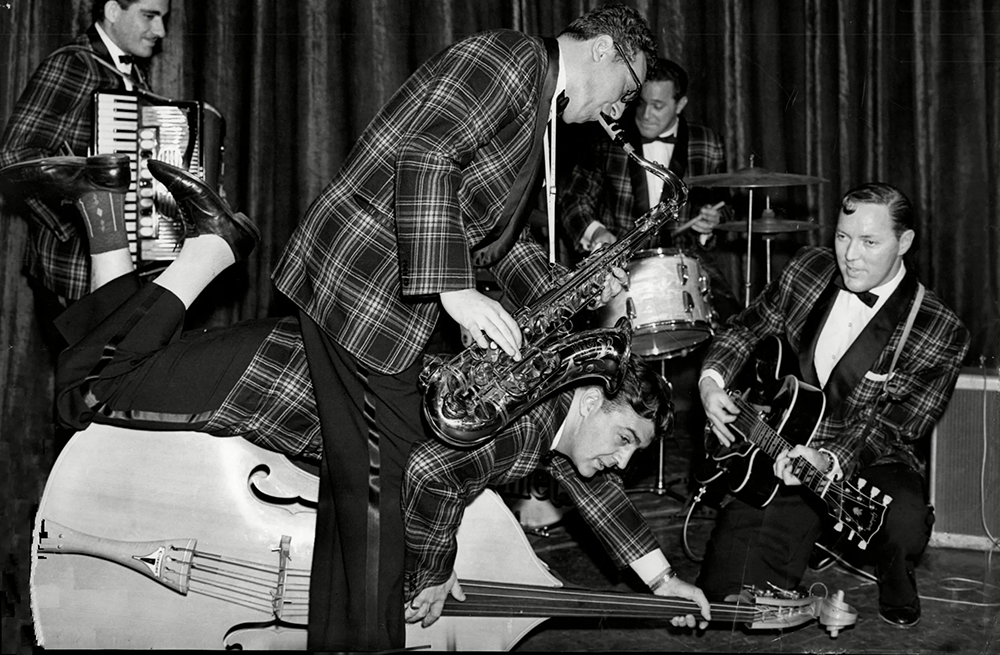 The Comets in action 1957
The Comets in action 1957
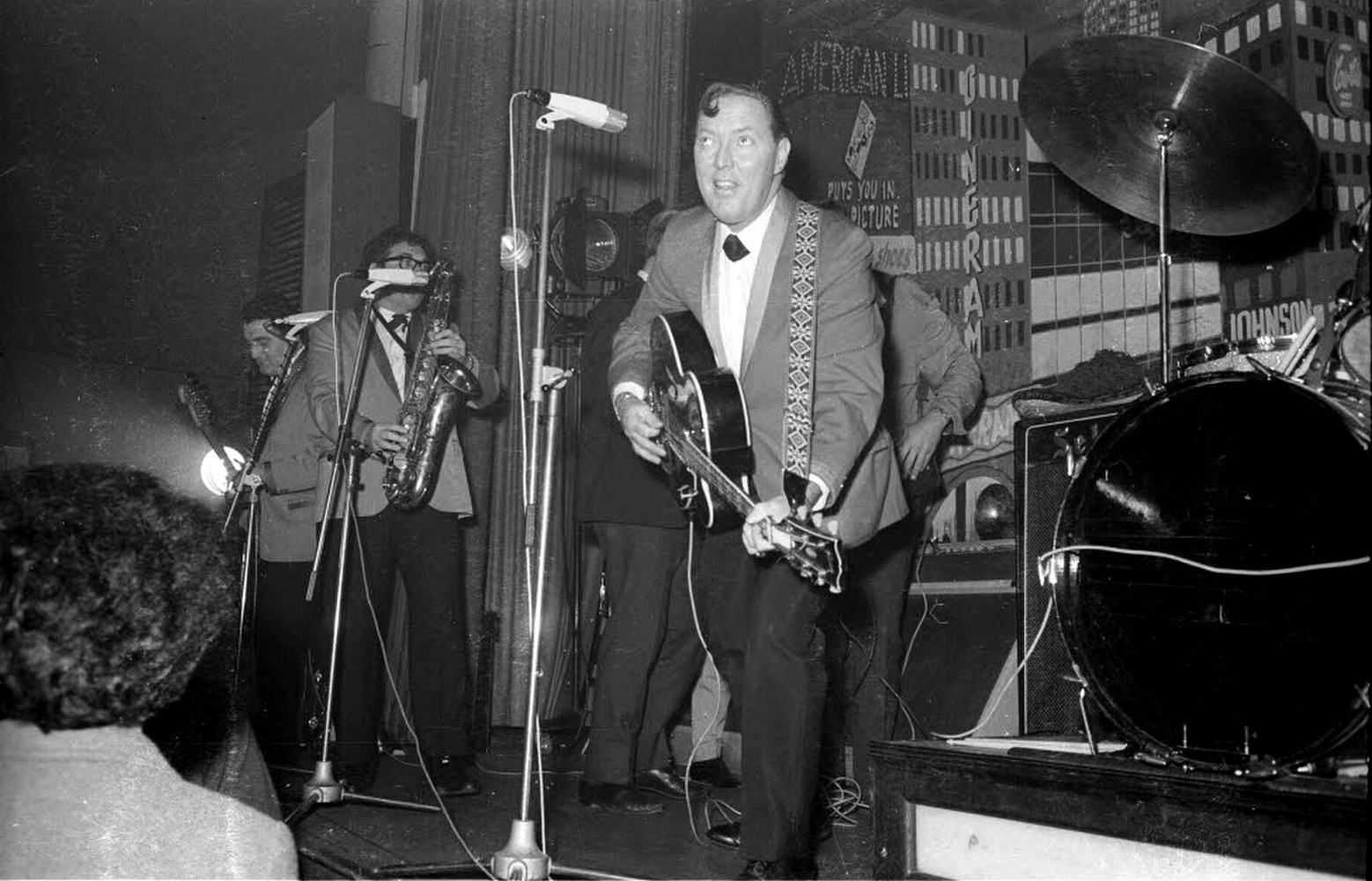 The Comets in 1966 at Star Palast Kiel, Germany
The Comets in 1966 at Star Palast Kiel, Germany
THE ROCKIN SIXTIES
Finally in 1960, Haley switched from DECCA to Warner Bros. and other labels, e.g. Orfeon, Logo, Newtown, United Artists, Kama Sutra and Sonet. All his European tours were very successful right into the late seventies, and also at American Rock’n’Roll revival shows Haley and his Comets were always the act receiving the liveliest response from the audience.
Haley celebrated his biggest European success in Great Britain, where Her Majesty Queen Elisabeth II came to one of his concerts during the second tour, letting him know that she was a big fan of his music. Many of Haley’s songs stayed in the British Top Thirty for weeks. Bill Haley & His Comets became the first mega stars of a musical style that was strictly aimed at young consumers and became the most important part of the music industry.
THE LAST YEARS
Having admitted to an alcohol problem in a 1974 radio interview for the BBC, Haley continued to battle alcoholism into the 1970s. Nonetheless, he and his band continued to be a popular touring act, benefiting from a 1950s nostalgia movement that began in the late 1960s and the signing of a lucrative record deal with the European Sonet label. After performing for Queen Elizabeth II at the Royal Variety Performance on November 26, 1979, Haley made his final performances in South Africa in May and June 1980. But broken by the cancer-death of the legendary sax player and best friend Rudy Pompilli in 1976, these last tours could not have been as unencumbered as they were.
Bill Haley died at his home in Harlingen on February 9, 1981, aged 55. He was discovered lying motionless on his bed by a friend who had stopped by to visit him. The friend immediately called the police and Haley was pronounced dead at the scene. Haley’s death certificate gave „natural causes, most likely a heart attack“ as being the cause. Following a small funeral service attended by 75 people, Haley was cremated in Brownsville, Texas.
Many rock’n’rollers followed, maybe with better voices and looks. But Bill Haley will always be the first. And there will never be a second one of whom can be said of having such influential importance in terms of the changes in popular music. Undoubtedly, the pioneer of Rock’n’Roll, had his limits – and he knew them. But he was certainly the king of those very things that mattered: the feeling for his audience and the beat of his music.


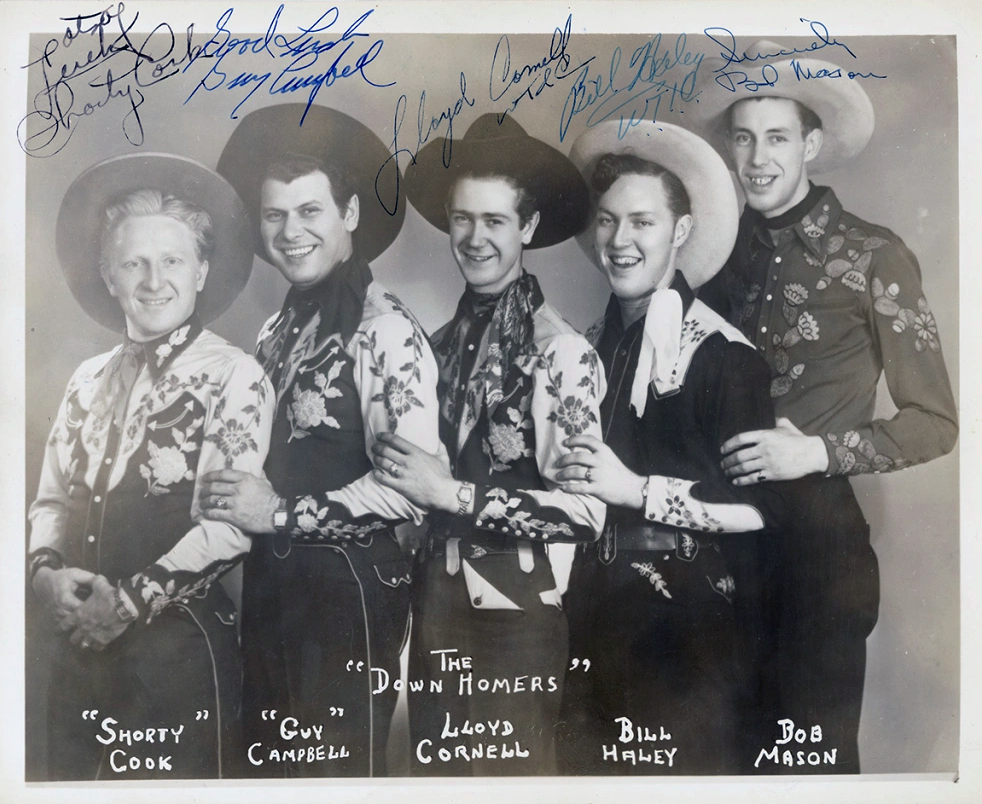 Bill Haley with the Down Homers
Bill Haley with the Down Homers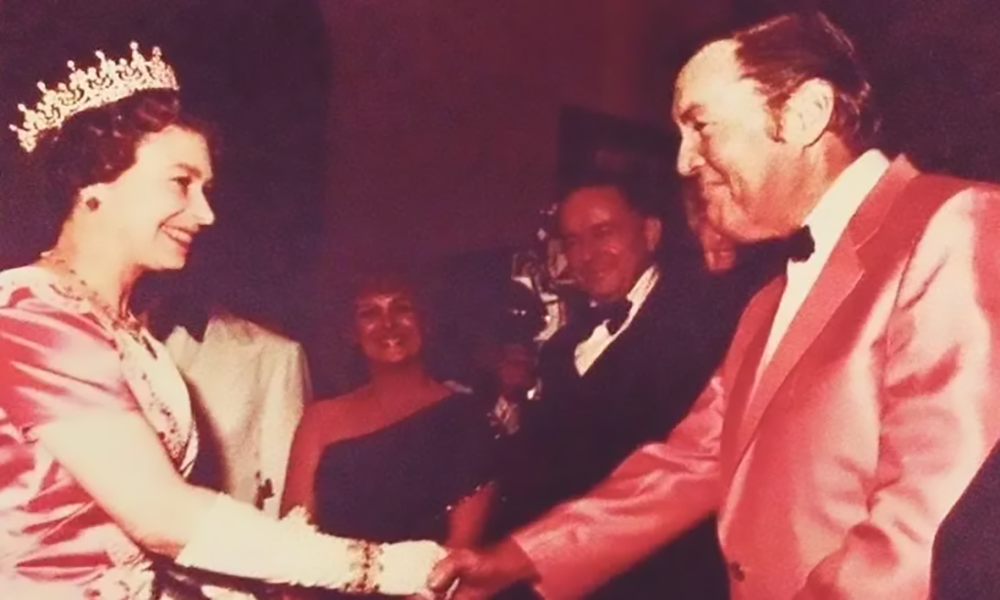 Bill Haley meeting Queen Elizabeth II. in 1979
Bill Haley meeting Queen Elizabeth II. in 1979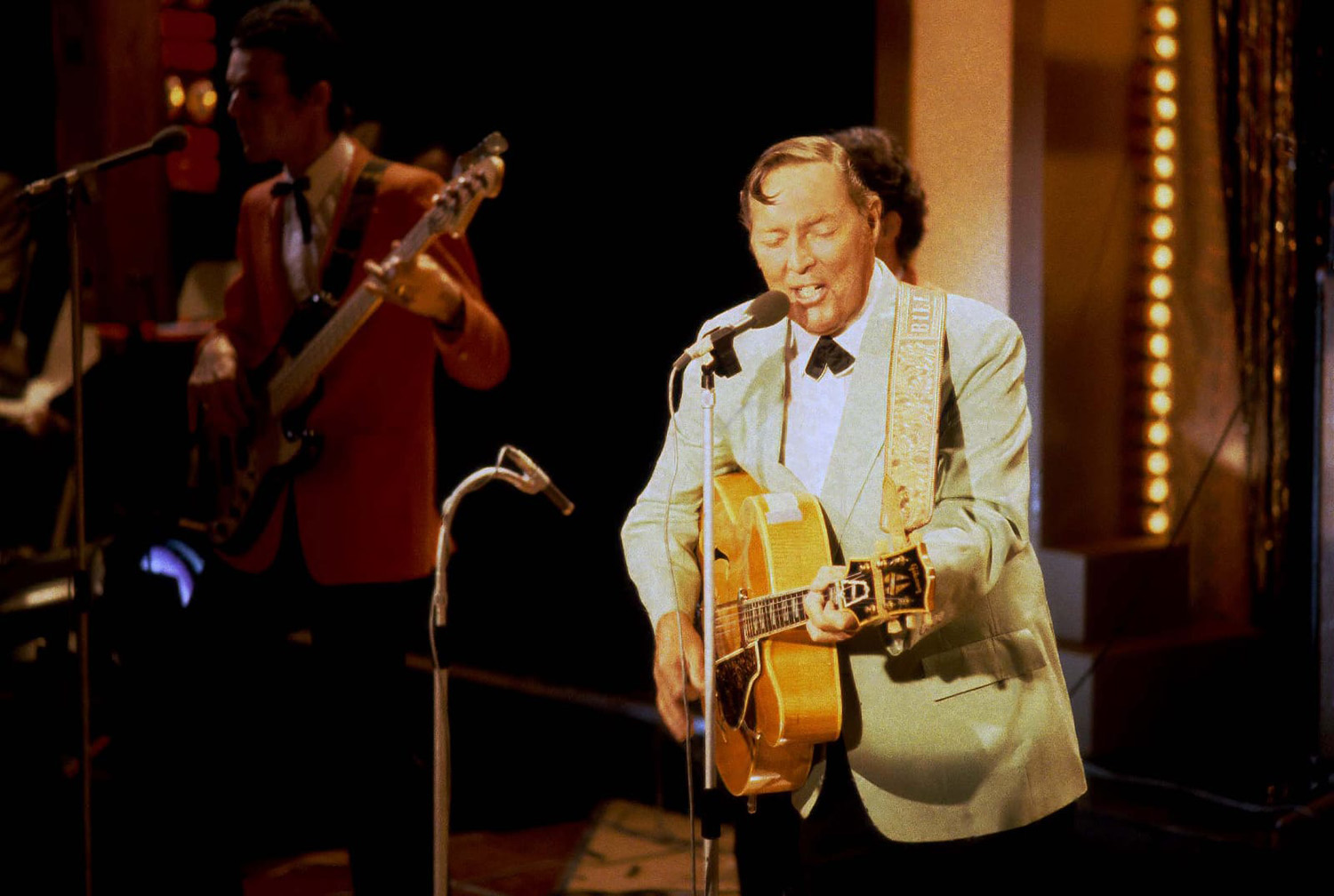 Bill Haley live in Sweden 1979
Bill Haley live in Sweden 1979